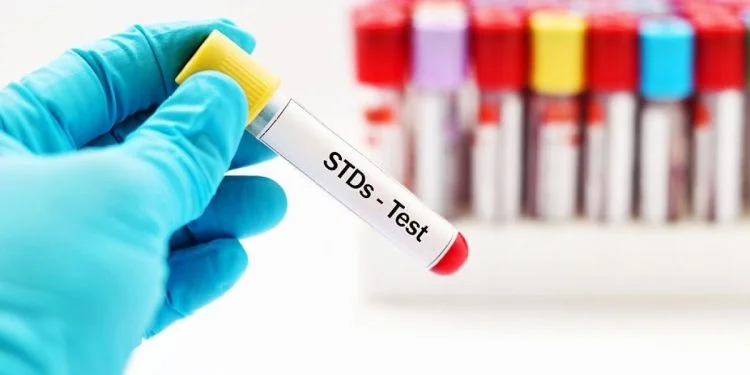To protect against sexually transmitted diseases (STDs), it is very important to take precautions such as using condoms during sexual contact, regular sexual health checks, vaccinations and choosing a reliable partner. If you have symptoms of a sexually transmitted infection or are at risk, it is important to contact a healthcare professional and get the necessary testing.
Sexually transmitted diseases (STDs) are infections that can be transmitted from one person to another through sexual contact. Such diseases occur due to different microorganisms or viruses.
The most common sexually transmitted diseases (STDs)
The most common sexually transmitted diseases are as follows:
• Genital herpes: This infection caused by the herpes simplex virus can cause sores on the lips or genital area.
• Gonorrhea (gonorrhea): This disease, caused by the Neisseria gonorrhoeae bacteria, can be transmitted through the urinary tract or during sexual contact.
• Syphilis: It is an infection caused by the bacterium Treponema pallidum and can cause serious health problems.
• Chancroid: This infection caused by Haemophilus ducreyi bacteria causes painful sores in the genital area.
• Human papillomavirus (HPV): HPV belongs to the family of viruses that cause genital warts. Some types are also associated with cervical cancer.
• HIV/AIDS: Human immunodeficiency virus (HIV) is a virus that has serious effects on the immune system and can cause AIDS. HIV can be transmitted through sexual contact.
• Chlamydia: This infection, caused by the bacterium Chlamydia trachomatis, can cause painless discharge in the genital area and can cause serious problems if left untreated.
• Hepatitis B and Hepatitis C: These viruses can cause liver infections and can be transmitted sexually.
• Trichomoniasis: This infection, caused by the parasite called Trichomonas vaginalis, may cause itching and discharge in the genital area.
It is transmitted through unprotected sexual intercourse
The most common way of transmission among sexual diseases is unprotected sexual intercourse. This increases the risk of transmitting infections if protective measures are not taken during sexual contact. Apart from this, the use of sexual toys during intercourse can also lead to contamination. In addition, sexually transmitted diseases can be transmitted to the baby by an infected mother during birth.
Treatment methods of sexually transmitted diseases
Treatment for sexually transmitted diseases (STDs) may vary depending on the type and severity of the infection. The most commonly used treatment methods are as follows:
• Antibiotics: Bacterial STDs, such as chlamydia and gonorrhea, are treated with antibiotics. Proper continued treatment is important for complete clearance of the infection. It is also important for couples to be treated, otherwise the infection may recur.[1]
• Antiviral medications: Viral STDs, such as herpes simplex virus and HIV, can be treated with antiviral medications. These medications can reduce symptoms, control the viral load, and slow the progression of the disease.[2]
• Other treatments: Treatment of some STDs may include different methods. For example, genital warts are often treated with surgery such as freezing, laser treatment, or cauterization. Treatment options may vary depending on the type of infection and symptoms.
• Vaccines: The HPV vaccine provides protection against sexually transmitted HPV types and against cervical cancer. [3] Additionally, the Hepatitis B vaccine also provides protection against the Hepatitis B virus.[4]
• Symptomatic treatment: Symptomatic treatments can be used to relieve or manage symptoms caused by STDs. For example, painkillers or anti-inflammatory medications can relieve pain or inflammation.
Regular doctor follow-up should be done
The type of treatment may vary depending on the type of infection, how early treatment is started, and the person’s response to the severity of the infection.
It is important for anyone who suspects an STD to consult a doctor. It is important to avoid sexual contact during treatment to prevent the spread of infection to partners. Additionally, regular post-treatment follow-up and check-up appointments are important to monitor the effectiveness of the treatment. Early diagnosis and treatment of STDs can help prevent complications and prevent the spread of the disease.
References:
- Antibiotic can help prevent common sexually transmitted infections. NIH RESEARCH MATTERS – National Institution of Health (NIH). April 25, 2023
- Mlynarczyk-Bonikowska B, Majewska A, Malejczyk M, Mlynarczyk G, Majewski S. Antiviral medication in sexually transmitted diseases. Part I: HSV, HPV. Mini Rev Med Chem. 2013 Nov;13(13):1837-45. doi: 10.2174/13895575113136660088. PMID: 24032509.
- Large Study Confirms that HPV Vaccine Prevents Cervical Cancer. National Cancer Institute. October 14, 2020. NCI Staff.
- Institute of Medicine (US) Vaccine Safety Committee; Stratton KR, Howe CJ, Johnston RB Jr., editors. Adverse Events Associated with Childhood Vaccines: Evidence Bearing on Causality. Washington (DC): National Academies Press (US); 1994. 8, Hepatitis B Vaccines.


